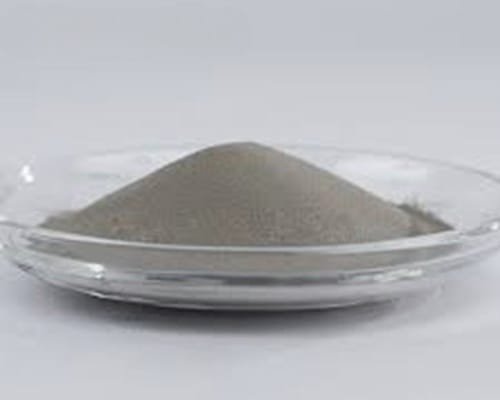Introduction
Inconel 625 Powder (Alloy 625, UNS N06625) is a high-performance nickel-based superalloy powder engineered for exceptional corrosion resistance, high strength, and outstanding performance at elevated temperatures. Strengthened primarily by solid-solution hardening from niobium and molybdenum additions, Alloy 625 maintains mechanical integrity in aggressive chemical and high-temperature environments.
In powder form, Inconel 625 is widely used in additive manufacturing (AM), hot isostatic pressing (HIP), metal injection molding (MIM), and thermal spray processes. Its combination of strength, weldability, and corrosion resistance makes it a preferred material in aerospace, marine, oil & gas, and power generation industries.
Detailed Description
Alloy 625 (UNS N06625) is composed primarily of nickel with significant additions of chromium, molybdenum, and niobium. These alloying elements provide a balance of oxidation resistance, pitting resistance, and mechanical strength without requiring precipitation hardening heat treatments.
Typical nominal composition (wt%):
Ni: Balance
Cr: ~20–23%
Mo: ~8–10%
Nb + Ta: ~3–4%
Fe: ≤5%
Minor elements: Mn, Si, C (controlled levels)
Spherical Inconel 625 Powder is typically produced through gas atomization, resulting in:
High sphericity for excellent flowability
Controlled particle size distribution (PSD)
Low oxygen and impurity levels
Uniform microstructure
These characteristics are critical for laser powder bed fusion (LPBF), directed energy deposition (DED), and cold or plasma spray systems. The alloy’s resistance to chloride-induced stress corrosion cracking and crevice corrosion makes it especially valuable in offshore and marine applications.
Inconel 625 also demonstrates excellent fatigue strength and creep resistance at temperatures up to approximately 800–900°C, depending on service conditions.
Applications
Inconel 625 Powder is widely used in:
Aerospace engine components
Exhaust systems and high-temperature ducting
Oil & gas downhole tools and valves
Marine hardware exposed to seawater
Additive manufacturing of complex structural parts
Chemical processing equipment
Thermal spray corrosion-resistant coatings
Its weldability and structural stability under cyclic loading make it particularly suitable for critical structural components.
Technical Parameters
| Parameter | Typical Value / Range | Importance |
|---|---|---|
| Standard | UNS N06625 | Identifies alloy specification |
| Purity / Chemistry | Controlled per ASTM/AMS specs | Ensures corrosion & mechanical performance |
| Particle Size | 15–45 µm / 45–106 µm (custom) | Matches AM or spray applications |
| Morphology | Spherical (gas atomized) | Improves flowability and packing density |
| Apparent Density | ~4.0–5.0 g/cm³ (varies by PSD) | Influences build consistency |
| Melting Range | ~1290–1350°C | Defines processing parameters |
Custom PSD ranges and material test reports (MTR) are available upon request.
Comparison with Related Nickel-Based Alloys
| Material | Key Advantage | Typical Application |
|---|---|---|
| Inconel 625 | Excellent corrosion resistance & weldability | Oil & gas, marine, aerospace |
| Inconel 718 | Precipitation-hardened high strength | Turbine disks & structural parts |
| Hastelloy C276 | Superior chemical resistance | Chemical processing |
| Alloy 600 | Good oxidation resistance | Furnace components |
Compared to Inconel 718, Alloy 625 offers better corrosion resistance and does not require complex heat treatment for strengthening, making it attractive for additive manufacturing workflows.
FAQ
| Question | Answer |
|---|---|
| Is Inconel 625 Powder suitable for LPBF? | Yes, spherical gas-atomized powder is compatible with LPBF systems. |
| Does it require heat treatment after printing? | It can be used in the as-built condition, though stress relief may be applied depending on application. |
| Is it resistant to seawater corrosion? | Yes, it offers strong resistance to pitting and crevice corrosion in marine environments. |
| Can PSD be customized? | Yes, particle size distribution can be tailored to your process requirements. |
| Are certifications available? | Yes, chemical composition reports and batch traceability documentation are provided. |
Packaging
Our Inconel 625 Powder (Alloy 625, UNS N06625) are meticulously tagged and labeled externally to ensure efficient identification and maintain high standards of quality control. We take great care to prevent any potential damage during storage and transportation, ensuring the powder arrives in perfect condition.
Conclusion
Inconel 625 Powder (Alloy 625, UNS N06625) delivers exceptional corrosion resistance, structural stability, and high-temperature strength for demanding industrial applications. With spherical morphology, controlled chemistry, and customizable particle size distribution, it supports advanced additive manufacturing and coating technologies across aerospace, marine, and energy sectors.
For detailed specifications and a quotation, please contact us at sales@thinfilmmaterials.com.





Reviews
There are no reviews yet.